Absolutely, the belief that long-tail keywords are universally easier to rank for and generate better conversions isn’t always accurate. There exist two distinct types of long-tail keywords, and some can be just as challenging to rank for as their shorter counterparts.
In this article, we’ll explore the differences between these two types of long-tail keywords and how to identify them. But before that, here’s an overview of what we’ll cover:
Unveiling Long-Tail Keywords
Long-tail keywords are specific search queries with lower search volumes compared to ‘head’ keywords. They are typically longer and more precise, often resulting in a higher conversion rate.
For instance, ‘meditation’ represents a ‘head’ keyword, garnering 211k searches monthly. Conversely, ‘can meditation make you smarter’ is a long-tail keyword with only 50 searches per month.

Unveiling the Origin of ‘Long-Tail’ Keywords
Long-tail keywords earned their moniker based on their placement along the ‘search demand’ curve. If we were to graph all Google search queries performed in a month, arranging them by their search volumes, it would take a shape resembling this:

At the ‘head’ of the curve, there’s a small set of keywords with exceptionally high search volumes, while the ‘tail’ encompasses billions of keywords with exceedingly low search volumes.
Specifically, in Ahrefs’ U.S. database (among the largest in the industry), there exist only 31,000 keywords with search volumes surpassing 100k searches per month. Conversely, there are a staggering 3.8 billion keywords with fewer than 10 searches per month.
Visualized as a pie chart, the distribution appears as follows:
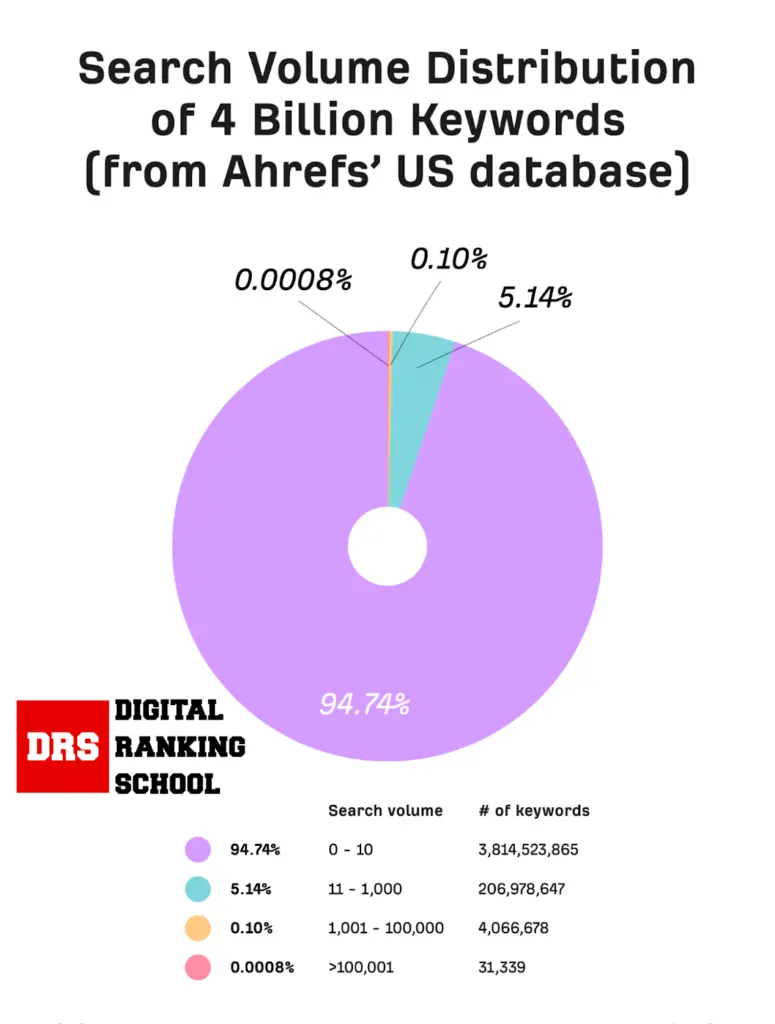
Indeed, keywords with fewer than 10 searches per month constitute nearly 95% of our U.S. keyword database. This statistic aligns with the fact that around 15% of daily Google searches are entirely new and have never been searched before.
While a long-tail keyword typically reflects a search query with lower search volumes, there isn’t a specific threshold that defines it. It often hinges on the comparison to its corresponding ‘head’ keyword.
Defining long-tail keywords solely by their length in words is a common misconception. For instance, there exist single-word keywords with less than 100 monthly searches and longer, five-word (or more) phrases with hundreds of thousands of monthly searches. Length alone doesn’t determine a keyword’s long-tail nature.

Absolutely, the categorization of a keyword as long-tail isn’t dictated by its length; rather, it’s primarily determined by the search volume associated with that keyword.
The Advantages of Long-Tail Keywords
Three Reasons to Embrace Long-Tail Keywords in Your SEO Strategy
Reason 1: Reduced Competition of Long-Tail Keywords
Consider this scenario: You’ve recently launched a blog centered around cryptocurrencies. Within this niche, numerous high-volume keywords exist, presenting the opportunity to drive substantial traffic to your blog:
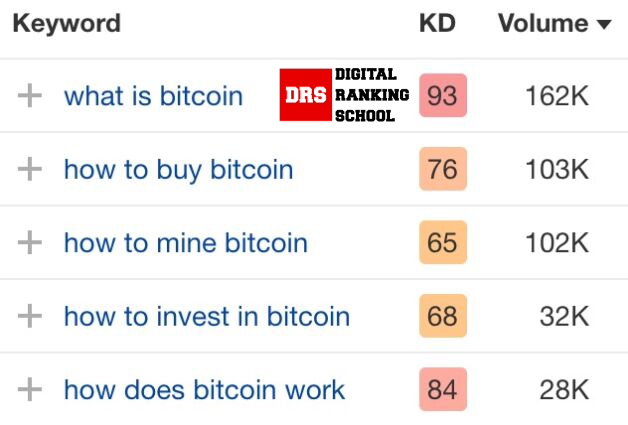
Those keywords might seem appealing, but the reality check is crucial. Consider the probability of your blog ranking for any of them in the near future.
All the mentioned keywords boast a notably high Keyword Difficulty (KD) score, implying an arduous journey to secure a first-page position on Google. Especially for a brand-new website, achieving this feat appears near-impossible.
Instead, let’s redirect our focus to some less popular search queries related to bitcoin:
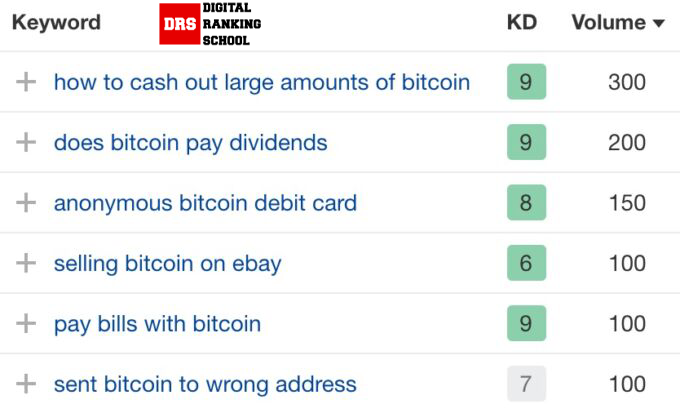
Those keywords might seem appealing, but the reality check is crucial. Consider the probability of your blog ranking for any of them in the near future.
All the mentioned keywords boast a notably high Keyword Difficulty (KD) score, implying an arduous journey to secure a first-page position on Google. Especially for a brand-new website, achieving this feat appears near-impossible.
Instead, let’s redirect our focus to some less popular search queries related to bitcoin:
Reason 2: Enhanced Manageability of Long-Tail Keywords
Let’s delve deeper into the comparison between these two keyword sets.
Consider ‘How to buy bitcoin,’ which appears deceptively simple. However, the top-ranking page for this query spans 3,400 words. In contrast, the leading page for ‘how to cash out large amounts of bitcoin’ is a concise 1,000 words.
Generally, addressing more general search queries demands comprehensive detail, while specific queries often require brief yet fulfilling answers, satisfying search intent concisely.
Essentially, crafting content for long-tail keywords typically demands less effort.
Moreover, exploring clusters of similar long-tail queries allows for content creation with slight variations. Here’s an example of such a group of keywords:
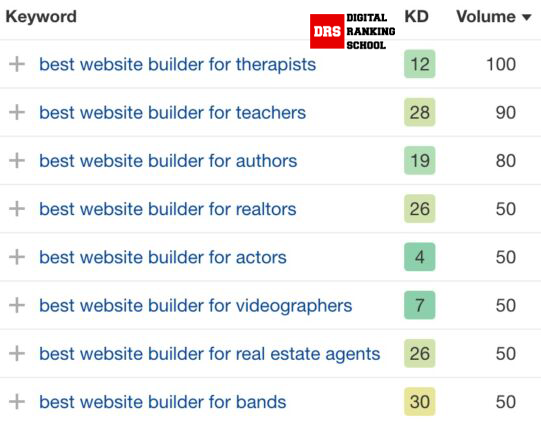
Absolutely! A single website builder software could effectively cater to therapists, teachers, or actors. This versatility allows targeting various searches with pages sharing around 80% similar content, while customizing the remaining 20% to suit each user profile.
In essence, it’s feasible to craft multiple pages in a day to address these similar long-tail searches efficiently.
Reason 3: Abundance of Long-Tail Keywords
“Indeed, individual long-tail keywords may not flood your website with substantial traffic. However, as you systematically address a multitude of these keywords, the cumulative search traffic tends to compound into a substantial volume.
Given the abundant presence of long-tail keywords across various industries, experiencing a shortage of them is highly improbable.
Returning to the example of ‘best website builder for __’ keywords, a search in Ahrefs’ Keywords Explorer yields over a thousand of such queries:
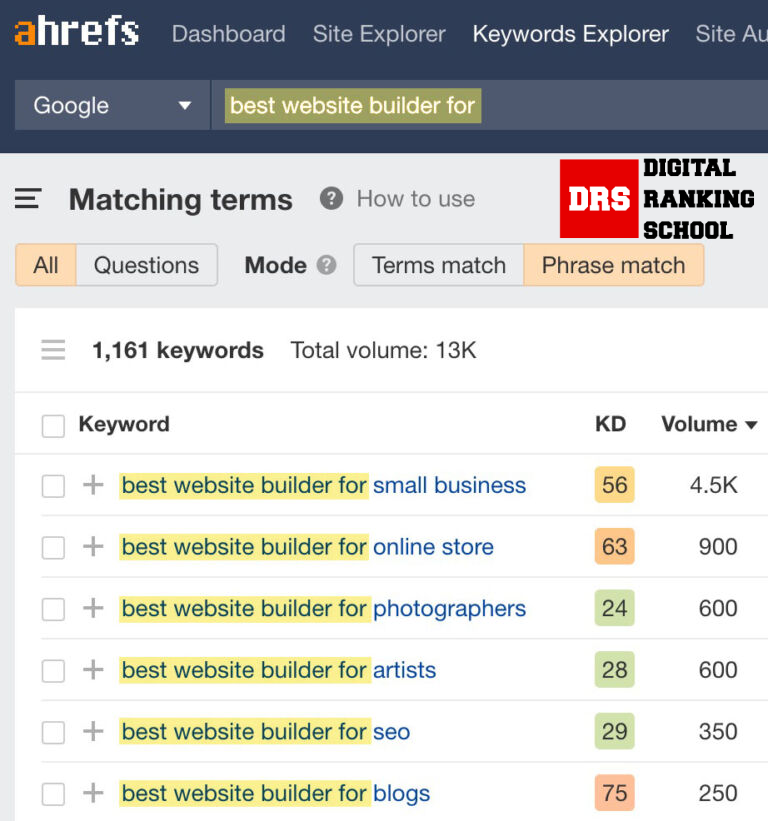
Strategies for Discovering Long-Tail Keywords
Exploring Long-Tail Keyword Discovery Methods
Method 1: Avoid Using Google Autosuggest
Some SEO experts recommend utilizing Google Autosuggest by entering your target keyword followed by various letters of the alphabet to source long-tail keywords.

Google Autosuggest serves to rapidly provide access to popular search queries. Consequently, upon examining the search volumes of keywords from the aforementioned screenshot, many are likely to exhibit reasonably substantial search volumes.
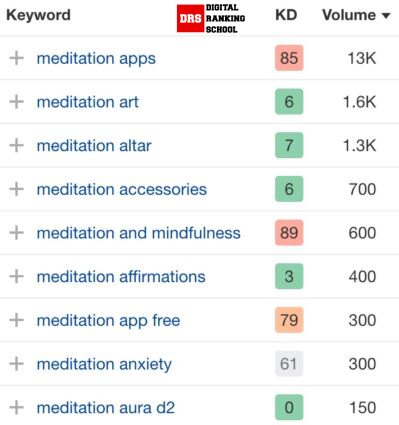
In essence, Google Autosuggest tends to provide highly popular search queries rather than the elusive long-tail keywords.
This principle extends to online tools like Answer The Public or Soovle, which utilize Autosuggest scraping to compile their keyword suggestions. A considerable portion of their keyword ideas often leans towards being popular and competitive.
Method 2: Utilize Ahrefs’ Keywords Explorer
Unlike the previous method, this approach eliminates tedious manual work. Simply input a defining term for your niche into Keywords Explorer and employ the search volume filter to instantly access thousands of long-tail keywords.

If your website is newly established and lacks authority, I’d suggest using the KD filter to target the least competitive keywords.
Additionally, explore the “Questions” feature, as it often reveals intriguing long-tail search queries phrased as questions.
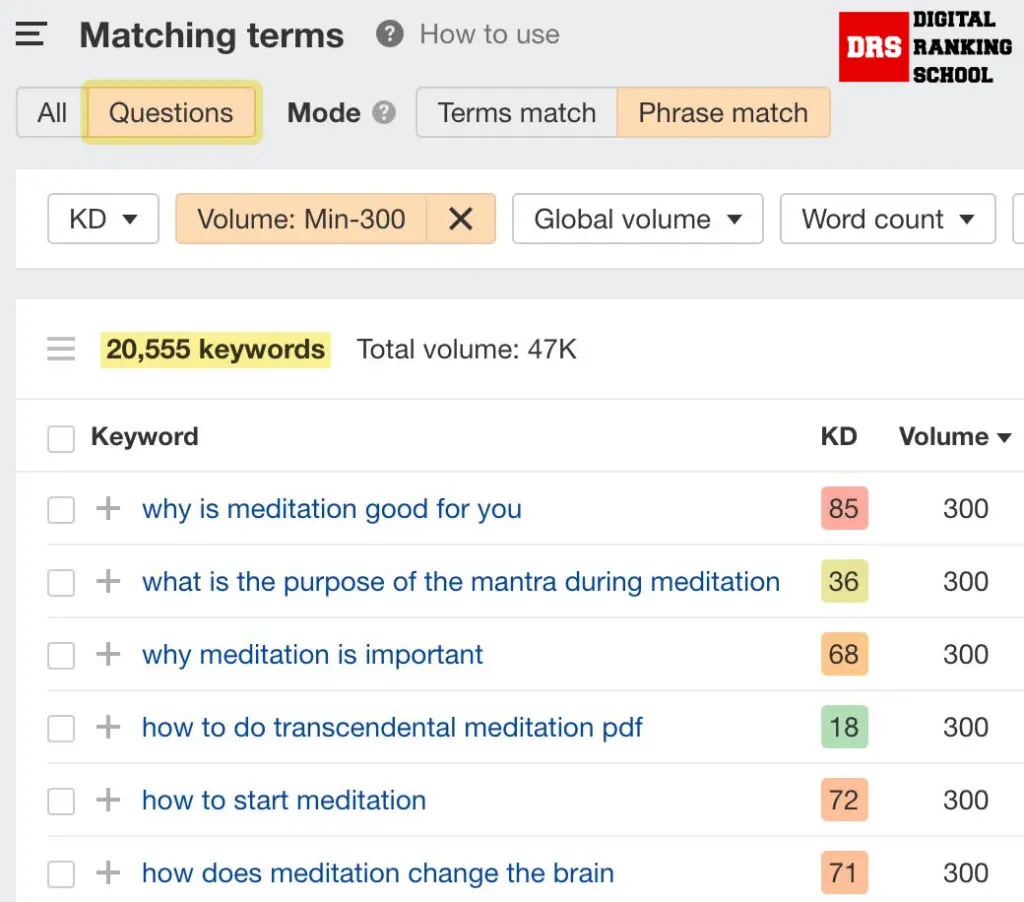
Method 3: Analyze Competitor Keywords
Another excellent reservoir of long-tail keywords is your competitors’ pool. Utilize Ahrefs’ Site Explorer to unveil the long-tail keywords they rank for.
Simply input your competitor’s website into Site Explorer and navigate to the Organic Keywords report to uncover the long-tail keywords driving traffic to their site:
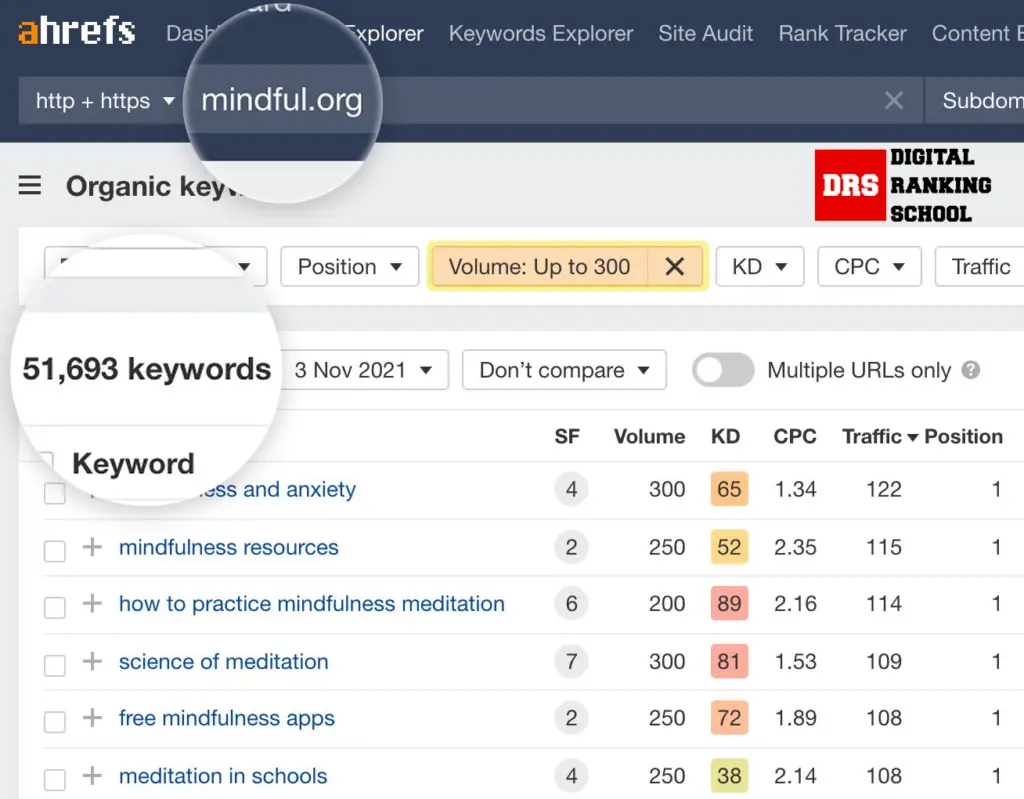
Repeat this process with 5-10 competitor websites, and you’ll unearth a treasure trove of long-tail keyword ideas, providing you with ample material to work on for months ahead.
Method 4: Explore Reddit, Quora, and Niche Forums
Many individuals turn to platforms like Quora and Reddit when they can’t find satisfactory answers to their questions on Google.
While perusing the ‘marketing’ topic on Quora, I stumbled upon this post:

A swift examination in Keywords Explorer unveiled that “marketing manipulation” is, in fact, a long-tail keyword boasting a low KD score.

The benefit of this approach is the potential for insightful discussions within forum threads, which can be invaluable when crafting content on the topic.
However, the downside lies in the somewhat laborious process of extracting long-tail keywords from forums. Additionally, you’ll still need to use an SEO tool like Keywords Explorer to assess the search volumes and KD of your keyword ideas.
Interestingly, the same keyword can often be efficiently discovered through Keywords Explorer initially, circumventing the need for this manual forum search.

Understanding Two Varieties of Long-Tail Keywords
Long-tail keywords aren’t uniform. While some signify distinct search queries, others are lesser-known variations of more popular searches.
The former type is termed ‘topical long-tail keywords,’ while the latter falls into the category of ‘supporting long-tail keywords.’
Supporting Long-Tail Keywords Explained
Allow me to illustrate this with an example. Consider the long-tail keyword ‘Best healthy treats for dogs,’ which garners a mere 100 searches per month:

However, several alternative search queries convey the same meaning but exhibit significantly higher search volumes:
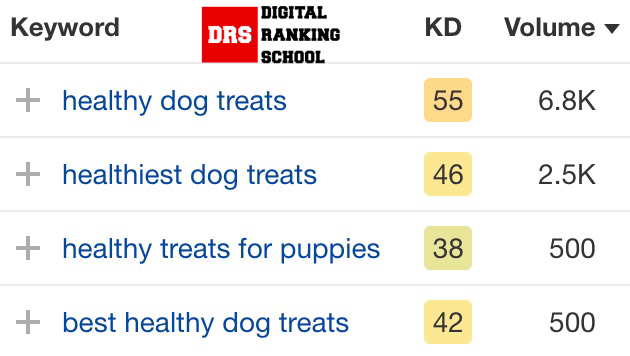
If you search each of these queries in Google, you’ll notice that the same set of pages rank at the top for all these keyword variations.
Google comprehends that individuals may phrase their searches differently while seeking the same content. Hence, it ranks identical pages for these varied keyword formulations.
This implies that if your page gains traction and ranks well for a high-traffic search query like ‘healthy dog treats’ (6.8k searches), it automatically secures rankings for all related long-tail variations. Thus, creating separate pages for each long-tail variant isn’t necessary; targeting them collectively with a single page suffices.
So, how can you discern if a long-tail keyword belongs to a broader topic?
At Ahrefs, we’ve developed a distinct feature precisely for this purpose known as ‘Parent Topic.’
When you input a keyword into Keywords Explorer, we analyze the top-ranking page for that keyword to identify if there’s a more popular search query the page is ranking for.
Here’s an example using ‘best healthy treats for dogs’:

It seems there was a technical issue and the screenshot didn’t come through. If you’d like, I can assist you in rephrasing that description or help with anything else related to the topic.
Topical Long-Tail Keywords: Niche-Specific Search Queries Explained
Absolutely, let’s rephrase that:
Next, consider a different variant of a long-tail keyword: ‘Incidence of fly bites on dogs’ ears.’
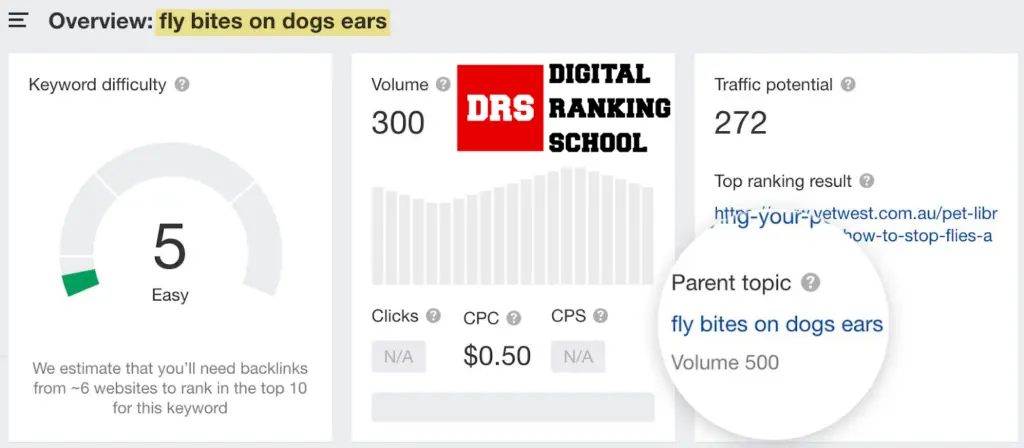
Got it, here’s a rephrased version:
In this instance, the Parent Topic aligns with the initial keyword, indicating that our chosen keyword represents the most prevalent search query for this specific topic. Targeting this particular long-tail keyword with a dedicated page is a viable strategy.
Moreover, successfully ranking for this topical long-tail keyword means automatically securing a position for all the less prevalent ‘supporting’ search query variations:
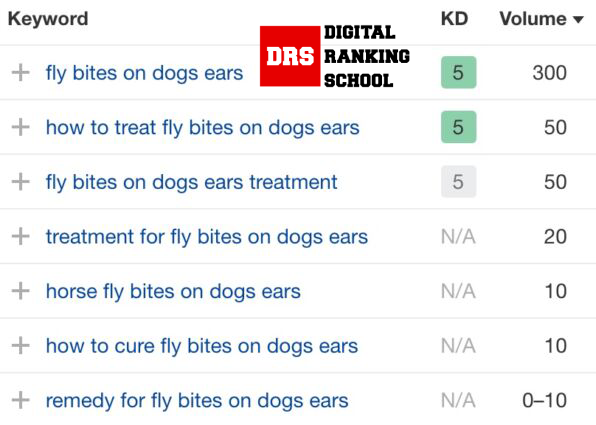
Sure, here’s a rephrased version:
However, the scenario isn’t always as clear-cut. Consider the following search query: ‘Natural remedies for dog sleep issues.’
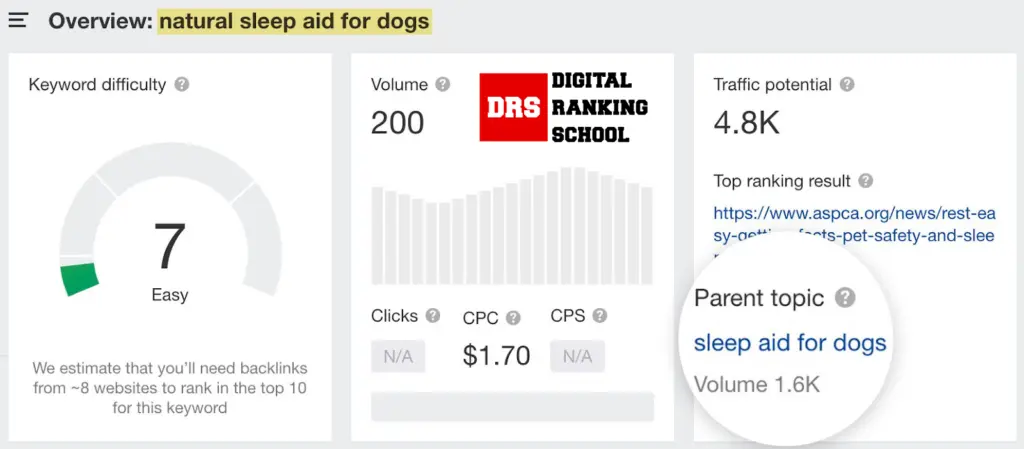
Here’s a rephrased version:
“The Parent Topic indicates that this long-tail keyword might simply be a variant of the search query ‘sleep aid for dogs’ (with 1.6k searches).
However, the inclusion of the term ‘natural’ in the original keyword appears to set it apart from the suggested Parent Topic. Individuals searching for this term may specifically seek natural alternatives to conventional pharmaceutical options.
Moreover, a review of the top search results for this long-tail keyword doesn’t predominantly focus on ‘natural sleep aids.’ Instead, it addresses ‘sleep aids’ in a more general context.

Absolutely, you’ve summarized it well! The Parent Topic serves as a helpful guide, but it’s crucial to conduct thorough analysis by checking the top-ranking pages for your keyword. Sometimes, a search query might indeed represent a unique and specific topic, warranting dedicated content creation, despite what the Parent Topic suggests. It’s all about understanding the nuances and specifics of each keyword context.
Final thoughts
That’s a fantastic wrap-up! Exploring long-tail keywords can truly be a game-changer for SEO strategies. If you need anything else or have more topics you’d like to dive into, feel free to let me know!

Hassan Essam
Guess what? Hassan Essam is not just the cool cat in charge at "Hassan Essam Project Management," he's also the proud pioneer—aka the first-ever Egyptian sensation—on the international judging panel of the Search Awards Global edition. Yup, breaking barriers and bringing that Egyptian flair to the global SEO stage!
Leave a Replay
About Me
Lorem ipsum dolor sit amet, consectetur adipiscing elit. Ut elit tellus, luctus nec ullamcorper mattis, pulvinar dapibus leo.
Recent Posts
Follow Us
Weekly Tutorial
Sign up for our Newsletter
Supercharge your online success with our expert-led SEO insights! Subscribe now for a journey to digital excellence. 🚀 #SEORevolution
